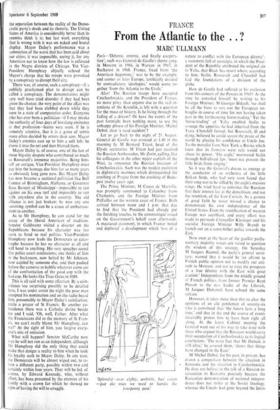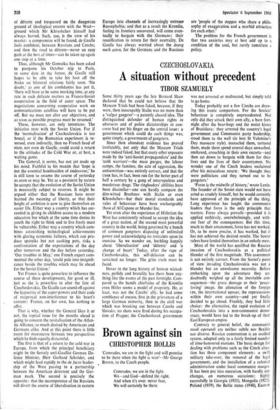From the Atlantic to the . . ?
FRANCE MARC ULLMANN
Paris—`Detente, entente, and finally coopera- tion'; such was General de Gaulle's theme song. in Moscow in 1966, in Warsaw in 1967, in Bucharest in 1968. France, freed from 'the American hegemony,' was to be the example, and sooner or later Europe, 'artificially divided by contradictory ideologies,' would come to- gether 'from the Atlantic to the Urals.'
Alas! The Russian troops have occupied Czechoslovakia, and the President of France, no more privy than anyone else to the real in- tentions of the Kremlin, is left with a question for the muse of history. Is he living through the fading of a dream? Or have the events of the past fortnight been nothing more, to use the unhappy phrase of his Foreign Minister, Michel Debrd, than 'a road accident'?
Let us go back to the night of 21 August. General de Gaulle was aroused at 1.40 in the morning by M Bernard Tricot, head of the Elysde secretariat. M Tricot had just received the Russian Ambassador, Mr Zorin, calling, like his colleagues in the other major capitals of the West, to announce the Russian invasion of Czechoslovakia. Such was the modest evolution in diplomatic manners which distinguished the crushing of Prague from the crushing of Buda- pest twelve years ago.
The Prime Minister, M Couve de Murville, was promptly summoned to Colombey from Chamonix, and the Foreign Minister from Prdfailles on the western coast of France. Both arrived between noon and 1 p.m. that day to find that the President had already put the finishing touches to the communiqué issued on the Government's behalf soon afterwards. A measured statement, in which France 'noted and deplored' a development which 'was of a 'Splendid—over eighty, arthritic, bad vision —just the man we need to handle the fourpenny post.' nature to conflict with the European détente': a statement full of nostalgia, in which the Presi- dent of the Republic attributed the original sin to Yalta, that Black Sea resort where, according to him, Stalin, Roosevelt and Churchill had laid the foundations of a division of the globe.
How de Gaulle had suffered at his exclusion from this concert of the Powers in 1945! At the time he consoled himself by writing to his Foreign Minister, M Georges Bidault, 'we shall be all the freer to sort out the European im- broglio in course of time for not having taken part in the forthcoming horse-trading.' Yet the 'horse-trading' of Yalta enabled Stalin to assuage the appetites he had inherited from the Tsars. Churchill fumed: but Roosevelt, ill and dying, believed he could secure the peace of the world by placing his confidence in Uncle Joe. To the moralist from New York a Russia which knew that its frontiers were safe would not abuse its power. 'The eagle,' murmured Stalin through half-closed lips, 'must not prevent the little birds from singing.'
So it was the General's dream to emerge as the conductor of an orchestra of the little Balkan birds, who had very soon found that their song was to be stifled by the eagle's massive wings. He tried hard to convince the Russians that their interest lay in the demolition, and not the retention, of the Iron Curtain. As a gesture of good faith he never missed a chance to demonstrate his own independence of the United States. Even the reunification of western Europe was sacrificed, and every effort was made to persuade Chancellor Kiesinger and his socialist Foreign Minister Willy Brandt to launch out on a come-hither policy towards the East.
Now even at the heart of the gaullist parlia- mentary majority voices are raised to question the wisdom of this strategy. On Saturday NI Jacques Baumel, the party's general secre- tary, warned that it would be 'an affront to French public opinion not to modify our atti- tude to Moscow, and not to treat the prospects of a true détente with the East with great caution.' Independents from the middle ground of French politics, from former Premier Rend Pluvon to the new leader of the Liberals, M Jacques Duhamel, have echoed the same refrain.
However, it takes more than this to alter the opinions of an old gentleman of seventy-six who is convinced that 'the future lasts a long time,' and that in the end the course of events invariably proves him to have been right all along. At the latest Cabinet meeting the General went out of his way to take issue with those who argued that the Russians would carry their occupation of Czechoslovakia to its logical conclusions. 'The mere fact that Mr Dubcek is still• alive,' he assured them, 'shows that things have changed in the East.'
M Michel Debrd, for his part, in private, has drawn a comparison between the situation in Rumania and the situation in Czechoslovakia. He does not believe in the talk of a Russian in- tervention in Rumania precisely because the Rumanian demonstration of national indepen- dence does not strike at the Soviet theology. whereas the Czechs had gone beyond the limits of détente and trespassed on the dangerous ground of ideological entente with the West— ground which Mr Khrushchev himself had always barred. Such, too, is the view of his master: a compromise will be found, de Gaulle feels confident, between Russians and Czechs; and then the road to détente—never an easy path at the best of times—can be taken up again one step at a time.
Thus, although Mr Gomulka has been asked to postpone his October trip to Paris, to some date in the future, de Gaulle still hopes to be able to take his foot off the brake on bilateral relations fairly soon. 'No doubt,' as one of his confidantes has put it, 'there will have to be some marking time, at any rate in such delicate matters as Franco-Soviet cooperation in the field of outer space. The negotiations concerning cooperative work on communications satellites will have to be put off. But we must not alter our objectives, and as soon as possible progress must be resumed.'
These, however, are only intentions. The initiative rests with the Soviet Union. For if the 'normalisation' of Czechoslovakia is too brutal, or if the Rumanian experiment is re- versed, even indirectly, then no French head of state, not even de Gaulle, could avoid a return to the attitudes of the Cold War or, at best, a waiting game.
The General, it seems, has not yet made up his mind. Faithful to his maxim that 'hope is not the essential handmaiden of endeavour,' he is still keen to resume the course of yesterday as soon as may be. Yet as a pessimist by nature he accepts that the evolution of the Soviet Union is necessarily subject to reverses. It might be argued either that the Russians have never learned the meaning of liberty, or that their height of ambition is now to give themselves an easier life. Either way a country which has suc- ceeded in giving its children access to a modern education but which at the same time denies its youth the right to think and to live freely must be vulnerable. Either way a country which com- bines astonishing technological achievements with glaring economic failures, which can pro- duce sputniks but not cooking pots, risks a confrontation of the expectations of the day after tomorrow and the day before yesterday. 'Our troubles in May,' one French expert com- mented the other day, 'could pale into insignifi- cance beside the troubles which may lie ahead for the Soviet Union.'
Yet France is quite powerless to influence the course of these developments, for good or ill, just as she is powerless to alter the fate of Czechoslovakia. De Gaulle can sound off against the hypocrisy of the super-powers and their code of reciprocal non-interference to his heart's content: France, on her own, has nothing to offer.
That is why, whether the General likes it or not, the topical issue for the months ahead is going to concern the revitalisation of the Atlan- tic Alliance, so much desired by Americans and Germans alike. And at this point there is little room for manoeuvre between two perspectives which he finds equally distasteful.
The first is that of a return to the cold war in Europe, from which the principal beneficiary might be the fiercely anti-Gaullist German De- fence Minister, Herr Gerhard Schr6der, and which might lead rapidly to the de facto leader- ship of the West passing to a partnership between the American deterrent and the Ger- man mark. The second is precisely the opposite : that the incompetence of the Russians will divert the course of liberalisation in eastern
Europe into channels of increasingly extreme Russophobia; and that as a result the Kremlin, feeling its frontiers uncovered, will come even- tually to bargain with the Germans: their reunification in return for their neutrality. De Gaulle has always worried about the drang nach °sten, for the Germans and the Russians are 'people of the steppes who share a philo- sophy of exaggeration and a morbid attraction for each other.'
The problem for the French government is that two anxieties may at best add up to a condition of the soul, but rarely constitute a policy.







































 Previous page
Previous page